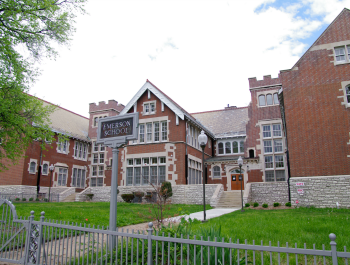Image

Malik Ahmed, CEO, Better Family Life, Inc.
Challenge: Over 80 percent of the residents in North St. Louis are barely able to make ends meet and suffer from low rates of high school graduation, substance abuse, long-term unemployment and blighted neighborhoods.
Since 1983, Better Family Life’s (BFL) mission has been to provide holistic family development in St. Louis through services for economic development, children and families, housing renovation, down payment assistance, cultural arts and community engagement. Over 80 percent of our residents are barely able to make ends meet for themselves or their family and suffer from low rates of high school graduations, substance abuse, problems with the criminal justice system, long-term unemployment and blighted neighborhoods.
BFL began with robust community outreach to understand local concerns, build a sustainable rapport and identify and train resident leaders in neighborhood stabilization. Our cultural thrust promotes self-worth and cultural pride to enable residents to recognize they could be community change-agents. This strategy built a cohesive group including residents, students and seasoned community activists who mobilized to implement systemic changes. We then persuaded stable families to move from affluent suburban neighborhoods to the city’s 26th Ward, which spurred housing rehabs and new construction without government assistance.
BFL’s $15 million renovation of a 60,000 square foot former elementary school into a community anchor and a hub for partnerships garnered new institutional and corporate support. For example, Washington University’s Brown School of Social Work and Public Health became a tenant in the facility for cross-sector research and education. The Missouri Department of Social Services opened a Family Resource Center for Temporary Assistance for Needy Families (TANF). Accenture, a multinational IT consulting corporation, supported the establishment of a call center and GED program. They are currently operating their Skills to Succeed initiatives to help our customers get access to living wage jobs.
Partnerships with the city of St. Louis and the mayor’s office strengthened our public safety, health and housing programs and joint community outreach efforts with the police department. The efforts achieved a 15 percent reduction in crime in the two most crime-ridden neighborhoods of the 26th Ward.
Our housing initiatives include over $1 million to repair homes for more than 50 senior citizens, $16 million in down payment and closing cost assistance invested in the city of St. Louis and help given to 700 first-time home buyers in the area.
 Eleven programs reached 6,000 high school students in 2015 to spread awareness of the dangers of sexually transmitted diseases and teen pregnancy, while simultaneously increasing class participation and graduation rates. A federal Teen Health Empowerment study, which measured the effectiveness of our approach and curriculum, found that we had the most positive results among several national organizations.
Eleven programs reached 6,000 high school students in 2015 to spread awareness of the dangers of sexually transmitted diseases and teen pregnancy, while simultaneously increasing class participation and graduation rates. A federal Teen Health Empowerment study, which measured the effectiveness of our approach and curriculum, found that we had the most positive results among several national organizations.Over 600 youth were placed in summer jobs by BFL as part of Missouri’s Summer Jobs League in 2015. Our Missouri Work Assistance program served 6,000 TANF families in St. Louis County from 2010 to 2015 and our training and placement assistance helped 3,900 adults gain full-time employment. Our in-house training program, a partnership with the Daruby Nursing School, is highly successful with 114 out of 175 students trained as Certified Nurse Assistants and 22 out of 25 trained as Certified Medicine Technicians fully employed in their field.
Our Neighborhood Resource Center in Ferguson assisted 5,000 adults and children meet basic needs and become a positive force for civic engagement. A mural at our facility, the largest in Missouri depicting the cultural heritage of people of the Afrikan Diaspora, is anticipated to attract academics, artists and tourists.
We learned that we must be led by the people whom we serve, which means having the humility to realize “we are our customers and our customers are us.” Residents of disinvested communities must receive holistic social services, workforce opportunities, affordable housing and commercial development. This requires pragmatic community leadership with the ability to shift the attention of stakeholders to the critical need to rebuild the inner-city and support under-served communities.

